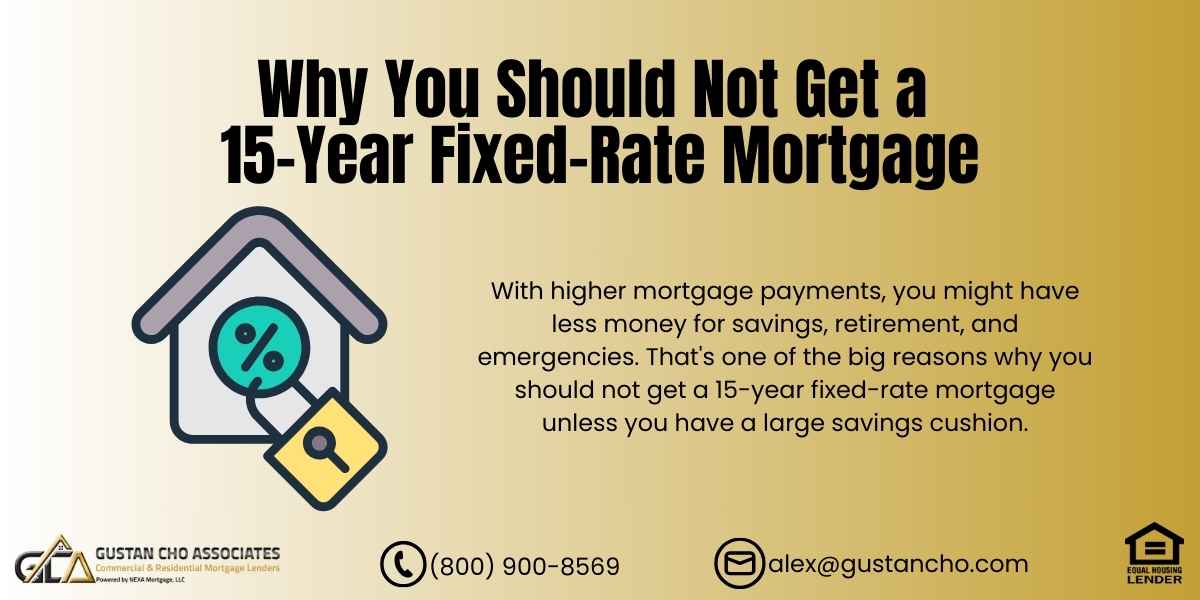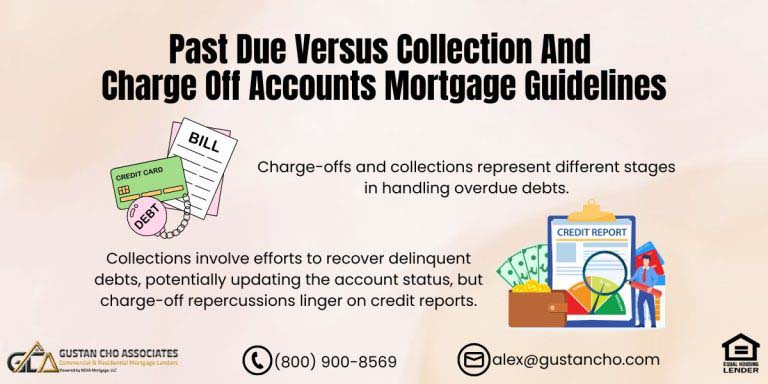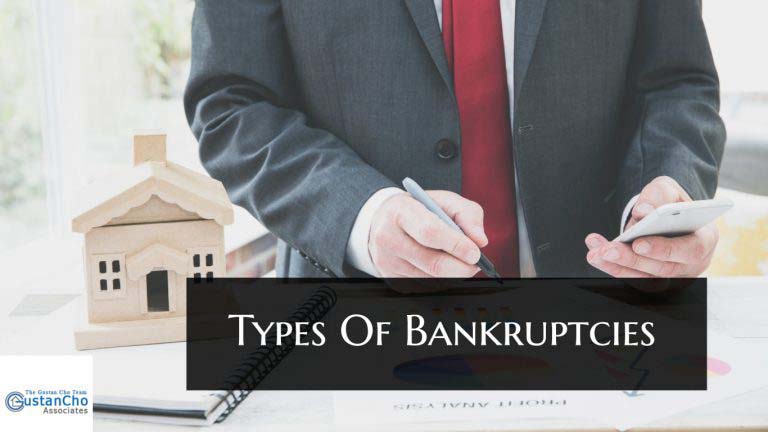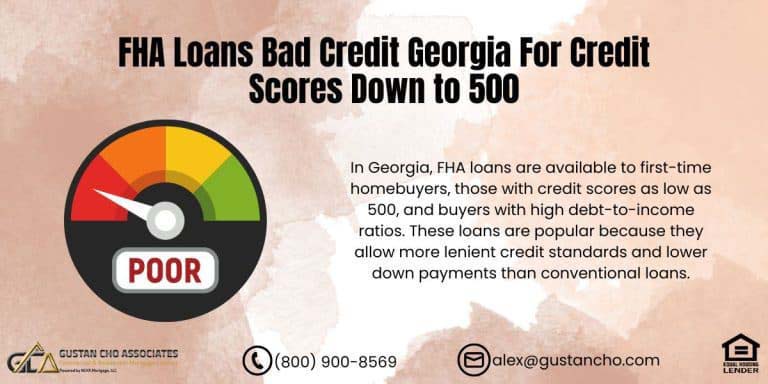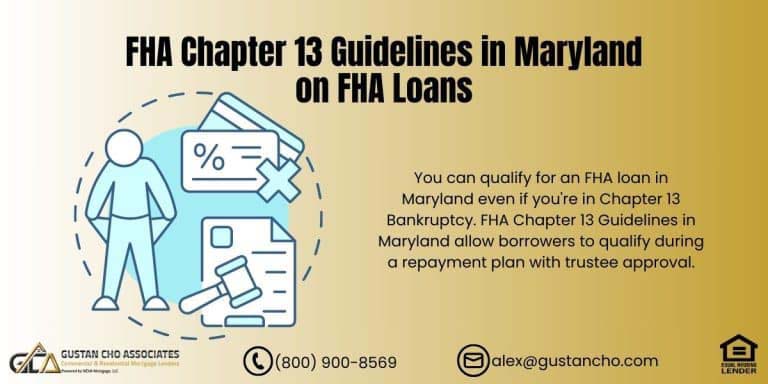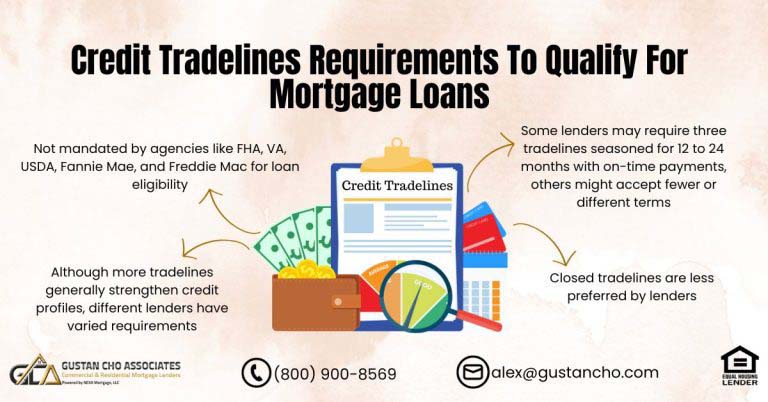Why You Should Not Get a 15-Year Fixed-Rate Mortgage: Think Twice Before Choosing a 15-year Fixed-Rate Mortgage.
If you’re considering a 15-year fixed-rate mortgage, you might be tempted by the idea of paying off your home faster and saving on interest. But before you commit, there are serious downsides you need to know. Many homeowners regret locking themselves into a high monthly payment when they could have had more flexibility with a 30-year mortgage.
At Gustan Cho Associates, we help borrowers make the best decisions for their financial future. In this guide, we’ll explain why you should not get a 15-year fixed-rate mortgage and what smarter alternatives you can consider.
1. Higher Monthly Payments Can Strain Your Budget
When considering why you should not get a 15-year fixed-rate mortgage, it’s important to consider some key points. First, this type of loan means you will pay off your house in 15 years, which sounds good. The downside is that your monthly installments will be considerably higher than a 30-year loan.
Also, with a higher payment, you might have less money for other things, like saving or spending on fun activities. So, while a 15-year mortgage seems like a fast way to own your home, the bigger monthly payments can be a big burden. It’s important to weigh these choices carefully before deciding.
For example, let’s compare payments on a $300,000 mortgage:
That’s an extra $621 monthly to pay off your loan faster. If an unexpected expense arises—medical bills, car repairs, or job loss—will you still be comfortable making that high payment?
2. Job Loss or Income Changes Can Put Your Home at Risk
Nobody has a crystal ball to predict their financial future. Even if you feel secure in your job today, what happens if your income drops? Just because we are in a bull market does not mean the economy will slow down. This holds true for workers who are on commission, such as car salespeople, realtors, loan officers, and insurance agents.
- If you’re self-employed, commission-based, or work in a volatile industry, a sudden dip in income could put you in a tough spot.
- If you lose your job or switch to a lower-paying role, your high mortgage payment could force you to drain your savings or take on debt to stay afloat.
- In the worst-case scenario, you could face foreclosure because you’re stuck in an unaffordable mortgage payment.
One of the reasons why you should not get a 15-year fixed-rate mortgage is the high monthly payments. A mortgage with a 30-year fixed rate enables you to make extra payments when possible while also guaranteeing that you won’t be obligated to make a large payment during tough times.
Can’t Afford Your Mortgage Due to Job Loss?
Apply Now And Find Out What Options You Have
3. Less Financial Flexibility for Emergencies
When thinking about why you should not get a 15-year fixed-rate mortgage, it’s important to consider your money choices. First, paying off your mortgage fast sounds good, but it can stop you from saving money for emergencies. If something unexpected happens, like a car repair or a medical bill, you want to have cash available.
- HVAC system breakdown? A new one can cost $5,000 – $12,000.
- Roof replacement? That’s $8,000 – $15,000 out of pocket.
- Car trouble? A major repair could cost $2,000 – $5,000.
When all your money is tied up in a higher mortgage payment, you don’t have a safety cushion for these real-life emergencies. Instead of rushing to pay off your mortgage early, consider building an emergency fund and keeping your options open with a more manageable mortgage payment.
4. You Could Miss Out on Investing Opportunities
While owning your home outright is great, locking too much money into your house could cost you in other ways.
For example, let’s say you invest that extra $621 per month (from the example above) in an index fund earning an 8% annual return:
- In 15 years, your investment could grow to $207,000.
- In 30 years, it could grow to $931,000!
When considering why you should not get a 15-year fixed-rate mortgage, it’s important to consider your money and future plans. With a 30-year mortgage, you have lower monthly payments. This gives you extra monthly cash to invest in things that can help you grow your wealth. Instead of tying up all your money in your home, you can keep it flexible for other goals. A 30-year mortgage can help you manage your money better and plan for the future.
5. The Housing Market and Interest Rates Can Change
Many people choose a 15-year fixed-rate mortgage to pay off their home faster and avoid interest. But what if interest rates drop in the future?
- If you’re locked into a 15-year loan, you have less flexibility to refinance into a lower-rate mortgage because your payments are already high.
- If you need to sell your home, you might not have enough cash savings for your next down payment because all your money went toward the mortgage.
One of the reasons why you should not get a 15-year fixed-rate mortgage is because a 30-year mortgage gives you the flexibility to refinance or sell when the market conditions are right—without the financial stress of a higher payment.
6. Life Shouldn’t Just Be About Paying Your Mortgage
When thinking about your home and money, you might wonder why you should not get a 15-year fixed-rate mortgage. A shorter mortgage means paying off your house faster but can also mean giving up things you enjoy. You might have to skip vacations or family trips that make happy memories.
Also, you might find it harder to save money for your kids’ college or your retirement. Plus, you might not have enough left over for hobbies and things you like to do. Balancing a home and a fun life is important, so think carefully about your choices.
A 30-year mortgage gives you more balance, allowing you to enjoy homeownership without making huge personal sacrifices.
Smart Alternative: Why You Should Not Get a 15-Year Fixed-Rate Mortgage & Get a 30-Year Mortgage Instead
Want the benefits of paying off your mortgage early without the risks of a 15-year mortgage? Try this strategy instead:
- Get a 30-year fixed-rate mortgage to keep your payment lower.
- Make extra principal payments with extra cash (e.g., tax refunds, bonuses, or raises).
- If times get tough, you still have the flexibility to pay the minimum without penalty.
With this method, you get the best of both worlds—the flexibility of a lower payment and the ability to pay off your home faster.
The Bottom Line: Why You Should Not Get a 15-Year Fixed-Rate Mortgage
A 15-year fixed-rate mortgage sounds great in theory, but for most homeowners, it’s a risky move that can limit your financial flexibility, drain your savings, and put you in a tough spot if life throws a curveball.
At Gustan Cho Associates, we help borrowers find the right mortgage for their unique financial situation. Whether buying your first home, refinancing or looking for a smarter loan strategy, we’re here to guide you.
👉 Thinking about getting a mortgage? Let’s find the best option for you. Contact Gustan Cho Associates today!
Frequently Asked Questions About Why You Should Not Get a 15-Year Fixed-Rate Mortgage:
Q: What is a 15-Year Fixed-Rate Mortgage?
A: A 15-year fixed-rate mortgage has a set interest rate for 15 years. It lets you pay off your home faster, but the monthly payments are higher than a 30-year loan.
Q: Why You Should Not get a 15-Year Fixed-Rate Mortgage?
A: A 15-year fixed-rate mortgage locks you into high monthly payments, which can be a big burden if you face job loss, medical bills, or unexpected expenses. A 30-year mortgage gives you more financial breathing room.
Q: Are 15-Year Mortgage Rates Lower than 30-Year Mortgage Rates?
A: Yes, 15-year mortgages usually have lower interest rates, but that doesn’t always mean they’re the best option. Even with a lower rate, the monthly payment is much higher, making it harder to manage other expenses.
Q: How Much More Will I Pay Monthly with a 15-Year Mortgage?
A: If you borrow $300,000, a 15-year mortgage could cost you about $600 more monthly than a 30-year loan. That’s money you could use for emergencies, investments, or savings instead of locking it into your mortgage.
Q: Can I Still Pay Off my Mortgage Early with a 30-Year Loan?
A: Yes! A 30-year mortgage allows for extra payments when you have extra cash, helping you pay off your home faster without increasing monthly payments.
Q: What Happens if I Lose My Job with a 15-Year Mortgage?
A: If you lose your job, a 15-year mortgage could put you at risk of foreclosure because the payments are so high. A 30-year mortgage lets you pay less each month, giving you more flexibility in tough times.
Q: How does a 15-Year Mortgage Affect my Ability to Save Money?
A: With higher mortgage payments, you might have less money for savings, retirement, and emergencies. That’s one of the big reasons why you should not get a 15-year fixed-rate mortgage unless you have a large savings cushion.
Q: Can I Refinance a 15-Year Mortgage Later if I Struggle with Payments?
A: Refinancing is possible, but you could be stuck with high payments if interest rates go up. A 30-year mortgage is safer because you always have the option to refinance or make extra payments without financial stress.
Q: Will a 15-Year Mortgage Help me Build Equity Faster?
A: Yes, you build home equity faster with a 15-year loan, but it’s harder to access emergency cash if you ever need emergency cash. A 30-year mortgage keeps more cash in your pocket for emergencies and investments.
Q: What’s the Smartest Alternative to a 15-Year Fixed-Rate Mortgage?
A: The best option is a 30-year fixed-rate mortgage with extra payments. You get a lower required payment but can pay more toward the loan when you have extra money. This keeps you financially flexible while still letting you pay off your home early if you choose.
This blog about “Why You Should Not Get a 15-Year Fixed-Rate Mortgage” was updated on March 5th, 2025.
Struggling with Mortgage Payments?
Find Out How to Keep Your Home & Avoid Foreclosure Today!


